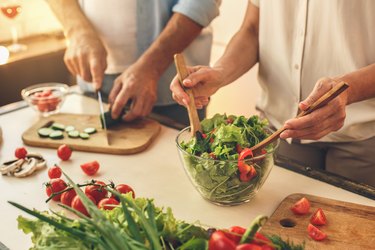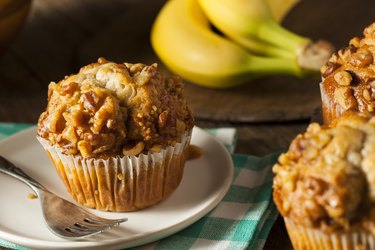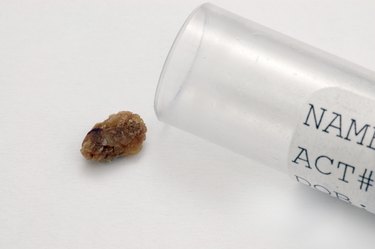
Chances are you don't give a whole lot of thought to your kidneys, the organs that filter blood and remove waste via your urine. Unless, that is, you're dealing with kidney stones.
Kidney stones are tan or brown masses that form in the kidneys. They can be as tiny as a grain of salt or — in rare cases — as large as a golf ball (ouch!). They're created when you have high levels of certain minerals in your urine, which then crystallize into the lump-like "stones."
Video of the Day
Video of the Day
And they're painful as heck — the National Institutes of Health (NIH) says the most common symptoms include sharp pain in your side, back, stomach or groin; bloody, cloudy or foul-smelling urine; frequent urination; and a burning sensation when you pee.
If you're having any troubling symptoms, the first step is to call your health care professional. "You need an evaluation to understand what constituents are causing your kidney stones," says Matthew Weir, MD, director of the Division of Nephrology at the University of Maryland Hospital, Baltimore. "Once you know what you're dealing with, your doctor can give you a plan to reduce the likelihood that you will form more stones, by altering your diet or prescribing medication."
As for getting rid of an existing kidney stone, it has to pass through your urine. It's not possible to "dissolve" a stone at home, but if it's quite large or painful, a urologist can surgically remove the stone or blast it into little pieces that are easier to pee out.
Plus, there are DIY measures you can take to reduce pain and decrease your risk of getting stones in the future. Here, we dive into the home remedies for kidney stones that can really make a difference — and debunk those that are a waste of time and money.
1. Drink Lots of Water

Let's hear it for H2O! A July 2015 analysis in Medicine found that for every additional half-liter (about two cups) of water you drink, your risk of growing a stone decreases by 8 percent.
"Water dilutes the concentration of minerals in your urine, making it less likely that they will crystallize," Dr. Weir says. He typically recommends stone-prone folks guzzle three liters (about 12 cups) of agua a day. But if you work out or spend time in the heat, up your intake even more.
And if you already have a stone, the NIH suggests that going gangbusters on your water bottle might help move the stone more quickly through your system.
2. DASH Toward a Healthful Diet
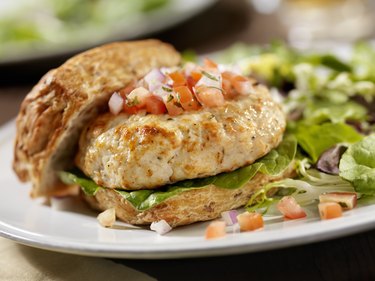
According to the National Kidney Foundation, the DASH diet (which stands for Dietary Approaches to Stop Hypertension) lowers your risk of kidney stones. This eating plan is low in saturated fat and sugar; rich in fruits, veggies and whole grains; and also includes low-fat dairy, nuts, seeds, fish, poultry and beans.
Bonus: The DASH diet could help people shed pounds. That's good news, because obesity and weight gain are linked to an increased risk of kidney stones, reports a 2020 Reviews in Urology study.
3. Slash Sodium

A September 2014 study in Urology found that sodium increases your kidney stone risk by anywhere from 11 to 61 percent. The U.S. Department of Health and Human Services recommends adults get less than a tablespoon of salt per day, so make sure you're sticking to that guideline.
To limit sodium, the NIH suggests checking nutrition labels on packaged food to make sure the percent daily value of sodium is 5 percent or less per serving. Eat at home more and avoid processed foods, fast food, lunch meat and canned soup and vegetables, which tend to be high in salt. When you do purchase pre-packaged foods, look for labels that say low- or no sodium or salt.
4. Limit Foods High in Oxalates
You can minimize your risk of stones by shifting your diet in more specific ways, tailored to the kind of kidney stone you've had. In this handy guide, the NIH breaks down how the foods you choose help stave off stones, according to your type.
If you know you're prone to calcium oxalate stones, you may want to restrict how many oxalate-rich foods you eat in a day. These include veggies like spinach, rhubarb, okra and beets, beans like navy beans and soybeans and nuts like almonds and cashews.
Because most foods high in oxalates are part of a healthy diet, talk to your doctor to make sure cutting oxalates is right for you, and consider working with a registered dietitian to make sure your diet remains healthy.
5. Pop Some Pain Medication
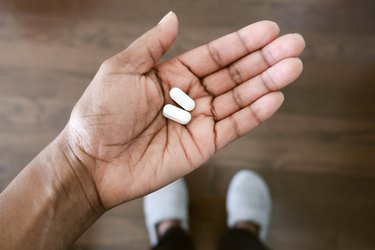
While over-the-counter pain relievers like ibuprofen and acetaminophen won't resolve a stone, Harvard Health Publishing says they can help relieve your discomfort in the meantime.
Related Reading
What About Lemon Juice?
For some people, kidney stones are caused by low levels of citrate, a compound in urine that helps prevent mineral deposits from turning into stones. According to a December 2014 study in the Korean Journal of Urology, consuming half a cup of lemon juice per day can significantly increase urinary citrate. And a November 2021 Nutrients review found that both lemon and orange juice consumption helped to protect against stone formation, although the data is limited.
Still, Dr. Weir isn't convinced. And the NIH says that while citrus juice might help, plain old water is better.
What About Apple Cider Vinegar?
Could ACV be a miracle cure for stones? In a July 2019 study of rats in EBioMedicine, the acetic acid in apple cider vinegar was found to suppress kidney stone formation.
But experiments done on rodents are a far cry from recommending it for human stones. "I am not aware of any published data about juices," Dr. Weir says. In other words: You'll have better luck sticking with tried-and-true methods.
What About Basil Juice?
Two small rat studies published in 2020 (in Annual Research & Review in Biology and Saudi Journal of Biological Sciences) suggest that basil extract might have a protective effect against kidney stones, thanks to its high levels of antioxidants like flavonoids and polyphenols.
That said, as we mentioned above, animal studies don't necessarily translate for people. Per Dr. Weir, see your doctor for kidney stones —and save your basil for pesto.
What About Celery Juice?
The 2020 Annual Research & Review in Biology study also discovered that the antioxidant activity in celery extracts given to rats offered protection from stones.
But for the same reasons above, whether or not it works for humans is up in the air.
What About Pomegranate Juice?
Pomegranates are another antioxidant powerhouse, and extract from this fruit showed promise in animal studies.
So in a small October 2014 study in Urolithiasis, researchers put pomegranates to the test. They gave people pomegranate extract for 90 days. The results? It failed to prevent kidney stone formation.
What About Kidney Bean Broth?
Word on the web is that guzzling the broth from kidney beans can help flush out kidney stones.
The verdict? "No," Dr. Weir says. 'Nuff said.
What About Dandelion Root Juice?
Frequently used in herbal medicine, dandelion root has many medicinal properties. Among them, it is a diuretic, meaning it increases the production of urine. An April 2018 in-vitro study (meaning the experiments were done in test tubes, rather than using human or animal subjects) in Renal Failure found that dandelion root extract inhibited the growth of stones.
But that certainly doesn't mean you should start slurping down dandelion to help your kidneys. "None of these homegrown items have been substantiated in clinical trials," Dr. Weir says.
What About Wheatgrass Juice?
According to an April 2016 review in the IOSR Journal of Pharmacy and Biological Sciences, wheatgrass juice is squeezed from the wheat shoot seeds, and has been used for medicinal purposes for more than 5,000 years, dating back to ancient Egypt and the Mesopotamian civilization. Due to its high chlorophyll content, it's purported to detoxify the liver, cleanse the blood and boost immunity.
What's more, a July 2017 study in the European Journal of Pharmaceutical and Medical Research found that, in vitro, wheatgrass had the potential to prevent the crystallization of stones.
But the National Kidney Foundation maintains that, "there is insufficient published medical evidence to support the use of any herb or supplement in preventing stones." Until more definitive research is done, don't count on wheatgrass.
What About Horsetail Juice?
A March 2021 review in Evidence-Based Complementary and Alternative Medicine explored the potential of horsetail to treat kidney disorders, including stones. The review suggests that this natural herbal remedy might have potential, because it is a diuretic, but cautions that with long-term use it might lead to vitamin deficiencies, among other possible toxic effects.
The researchers conclude that we don't know yet whether horsetail is effective or what dosage might be toxic. In other words, further research is needed before horsetail is recommended for human consumption to help with kidney stones. "There is no good data about horsetail juice," Dr. Weir says.
- NIH: "Kidney Stones"
- Medicine: "Self-Fluid Management in Prevention of Kidney Stones: A PRISMA-Compliant Systematic Review and Dose–Response Meta-Analysis of Observational Studies"
- National Kidney Foundation: "The DASH Diet"
- Reviews in Urology: "Obesity and Its Impact on Kidney Stone Formation"
- Urology: "Impact of Nutritional Factors on Incident Kidney Stone Formation: A Report From the WHI OS"
- U.S. Department of Health and Human Services : "2015-2020 Dietary Guidelines"
- Harvard Health Publishing: "5 things that can help you take a pass on kidney stones"
- Korean Journal of Urology: "Medical and Dietary Therapy for Kidney Stone Prevention"
- Nutrients: "Role of Citrus Fruit Juices in Prevention of Kidney Stone Disease (KSD): A Narrative Review"
- EBioMedicine: "Dietary vinegar prevents kidney stone recurrence via epigenetic regulations"
- Annual Research & Review in Biology: "Basil (Ocimum basilicum L.) and/or Celery (Apium graveolens L.) Leaves Aqueous Extracts Role in Opposition to Drinking Contaminated Water Induced Male Rats Urinary Stones and Renal Deteriorations"
- Saudi Journal of Biological Sciences: "Physiological and histopathological study on the influence of Ocimum basilicum leaves extract on thioacetamide-induced nephrotoxicity in male rats"
- Urolithiasis: "Oxidative stress and nephrolithiasis: a comparative pilot study evaluating the effect of pomegranate extract on stone risk factors and elevated oxidative stress levels of recurrent stone formers and controls"
- Renal Failure: "Inhibitory effects of taraxasterol and aqueous extract of Taraxacum officinale on calcium oxalate crystallization: in vitro study"
- IOSR Journal of Pharmacy and Biological Sciences: "Green Blood Therapy of Wheat Grass - Nature’s Finest Medicine’- A Literature Review"
- European Journal of Pharmaceutical and Medical Research: ""STUDIES ON INHIBITION OF CALCIUM OXALATE CRYSTALLISATION BY USING PLANT EXTRACT AND SOIL MICROFLORA"
- National Kidney Foundation: "Kidney Stones"
- Evidence-Based Complementary and Alternative Medicine: "Phytochemistry and Pharmacology of the Genus Equisetum (Equisetaceae): A Narrative Review of the Species with Therapeutic Potential for Kidney Diseases"
- Harvard Health Publishing : "Kidney stones are on the rise"
Is this an emergency? If you are experiencing serious medical symptoms, please see the National Library of Medicine’s list of signs you need emergency medical attention or call 911.
